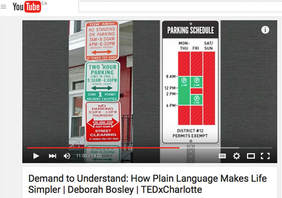I recently saw an article stating we haven't made many, if any, major gains in the battle against jargon over the past 25 years. There was proof from all the big players in many sectors. I agree we have a big challenge ahead, but I also feel we can win the fight with a strategic approach that proves the benefits of plain language.
Three ways to win the battle for plain language
1. Show and tell

Build a diary or archive of bad examples made great with plain language writing, editing and design. A picture of plain language results can clearly show someone how to effectively use clear language and readable designs to really connect with clients.
Work closely with your designers, for print, visual and online products, to ensure they understand the techniques of clear design. We too often focus on the written components and forget about the creative.
Back up your claims with benefits.
2. Teamwork
3. Be in it for the long term
Show and tell, teamwork and a long term commitment together can help you put, keep and enhance plain language on your organization's agenda. You can expect to meet resistance. You can expect to have lots of chats explaining the process. And, you can win people over by selling the benefits.
 RSS Feed
RSS Feed
